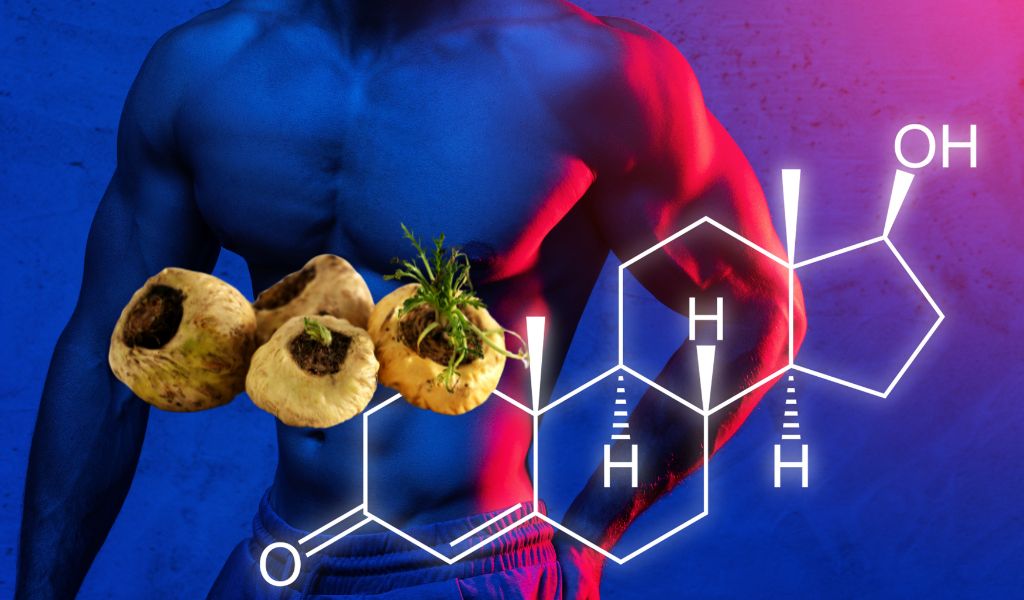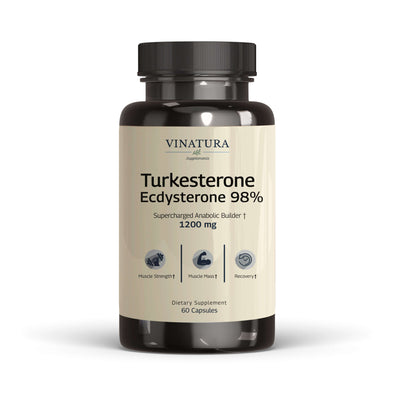
Does Maca Root Increase Testosterone? Or Lower Testosterone?
Maca root recently gained popularity as a potential natural remedy for improving sexual function and fertility. One commonly asked question is its impact on testosterone levels.
Testosterone is crucial in muscle mass, strength, libido, bone density, and overall well-being. So, what is the relationship between maca root and testosterone? Does maca root increase testosterone? Let's discuss this topic.
Before exploring further, please read the disclaimer located at the end of this webpage.
Does Maca Root Increase Testosterone?

There is no direct evidence that maca root increases testosterone levels. While it is believed to nourish the endocrine system, which is important in testosterone production, scientific case studies in humans have not shown a direct impact of Maca root on testosterone levels.
So what does science say about this query: "Does Maca root increase testosterone and how"? Let's continue analyzing according to the following research.
What Science Says About Maca and Testosterone?

One 12-week study examined the effects of Maca on sexual desire. Men aged 21-56 received either 1500 mg or 3000 mg of Maca or a placebo. Self-perception of sexual desire, depression, and anxiety were measured at 4, 8, and 12 weeks. [1]
Maca showed an improvement in sexual desire starting from 8 weeks of treatment. Serum testosterone did not differ between the Maca and placebo groups. The analysis confirmed that Maca independently improved sexual desire, unaffected by changes in mood or hormone levels. Overall, therapy with Maca enhanced sexual desire.[1]
In another study, maca extracts possess intriguing biological properties and harbor compounds akin to testosterone. As serum testosterone levels are associated with sexual desire, oral consumption of Maca has been observed to enhance sexual performance while leaving reproductive hormone levels unaffected.[2]
Moreover, the study aimed to evaluate the effects of Maca on semen parameters and hormone levels in healthy adult men. A group of 20 volunteers aged 20-40 were given Maca or placebo for 12 weeks.
The results showed that Maca positively impacted sperm concentration and motility, indicating its fertility-enhancing properties in men. Hormone levels did not show significant changes after the 12-week trial. [3]
What Does Maca Actually Do?

From the above studies, we can see that Maca has an impact on sexual desire. So, what does Maca actually do?
The study found that serum testosterone levels were not associated with the improvement in sexual desire through treatment with Maca.
While testosterone is necessary for routine or increased levels of sexual desire, supra-physiological levels of testosterone do not necessarily stimulate sexual activity in normal men.
In contrast, treatment with Maca may be a promising alternative as it improves sexual desire without affecting serum testosterone levels. [1]
Instead, Maca contains testosterone-like compounds that can bind to the human androgen receptor. This interaction promotes transcription pathways regulated by steroid hormone signaling, which plays a crucial role in various physiological processes.
By influencing these pathways, Maca can potentially impact hormone-related functions in the body, which can improve sexual. [2]

Here are some important insights we have gathered through the analysis of studies that you can take away:
Therapy involving the consumption of tablets of Maca at a dosage of 1.5–3.0 g per day for a duration of 8 or 12 weeks had a positive impact on sexual desire. Interestingly, this improvement was observed independently of any mood changes or serum testosterone levels.
These findings suggest that Maca supplementation may provide a potential avenue for enhancing sexual well-being in men.
Frequently Asked Questions
Does Maca Root Lower Testosterone If Used Incorrectly?
If misused, it's possible that Maca or any supplement could have unintended effects. However, the specific impact of Maca on testosterone levels, mainly if misused, is not well-documented in scientific literature.
Does Maca Root Increase Estrogen In Males?
The impact of maca root on estrogen levels in males needs to be well-established, and scientific evidence on this specific aspect is limited. Some studies have investigated the effects of Maca on hormones, including estrogen, but the results are inconsistent across all research.
What Happens If You Take Maca Root Every Day?
Incorporating Maca into your daily diet offers numerous health benefits. It can effectively lower blood pressure and alleviate symptoms associated with menopause. Additionally, Maca has been shown to enhance fertility in both men and women.
Are There Any Risks or Side Effects Associated with Taking Maca?
Health authorities generally consider Maca root and maca powder safe, although a few users have reported experiencing side effects. These may include mood swings, cramps, stomach discomfort, and difficulty sleeping.
Conclusion
Maca root may not directly affect testosterone levels but has shown benefits in improving sexual desire and fertility without altering hormone levels. It may act through mechanisms separate from testosterone production. I hope this article is helpful for you when searching for the answer to the question: Does Maca root increase testosterone? Last, consultation with a healthcare provider is always advisable before incorporating Maca into a daily regimen.
References
- [1] Gonzales, G. F., et al. “Effect of Lepidium Meyenii (MACA) on Sexual Desire and Its Absent Relationship with Serum Testosterone Levels in Adult Healthy Men.” Andrologia, vol. 34, no. 6, Dec. 2002, pp. 367–372, https://doi.org/10.1046/j.1439-0272.2002.00519.x.
- [2] Bogani, P., et al. “Lepidium Meyenii (Maca) Does Not Exert Direct Androgenic Activities.” Journal of Ethnopharmacology, vol. 104, no. 3, Apr. 2006, pp. 415–417, https://doi.org/10.1016/j.jep.2005.09.028. Accessed 6 Oct. 2022.
- [3] Melnikovova, Ingrid, et al. “Effect OfLepidium MeyeniiWalp. On Semen Parameters and Serum Hormone Levels in Healthy Adult Men: A Double-Blind, Randomized, Placebo-Controlled Pilot Study.” Evidence-Based Complementary and Alternative Medicine, vol. 2015, 2015, pp. 1–6, https://doi.org/10.1155/2015/324369. Accessed 21 Nov. 2021.
Author

Product Disclaimer
Including an ingredient or study does not evaluate, endorse, or recommend any Vinatura product or any third-party product. Some ingredients discussed may not be used in any Vinatura product.
The content of the articles has not been evaluated by the Food and Drug Administration (FDA) and is not intended to promote or endorse any specific product. Any products sold on this website are not intended to diagnose, treat, cure, or prevent any disease.
Opinions and Endorsements
Any claims, statements, or opinions expressed in the articles are those of the author(s) and do not necessarily reflect the views or opinions of the manufacturers of the dietary supplement products. The products sold on this website are separate from the content of the articles and are not directly endorsed or associated with the information presented here.
Liability Disclaimer
The author(s) of the articles, website, and manufacturers of the dietary supplement products do not assume any liability for any potential consequences arising from the use of the information provided in the articles. Ingredient effects, dosages, and safety vary by individual, formulation, and context; some ingredients interact with medications or may be unsuitable during pregnancy or lactation. It is recommended that individuals consult with a qualified healthcare professional before making any dietary or lifestyle changes, including the use of dietary supplements.
Product Usage
Please refer to the product labels and packaging for specific usage instructions and guidelines for the dietary supplement products sold on this website.
Customer Support
For any concerns or questions regarding the dietary supplement products, please contact our customer support team, who will be more than happy to assist you.





Leave a Comment
Be the first to comment.
What do you think?